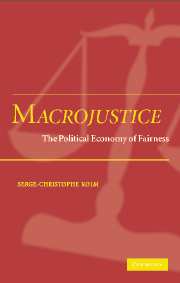Book contents
- Frontmatter
- Contents
- Presentation
- PART ONE BASES: CONSENSUS, FREEDOMS, AND CAPACITIES
- PART TWO OVERALL DISTRIBUTIVE JUSTICE: ELIE (EQUAL LABOUR INCOME EQUALIZATION)
- PART THREE COMPARISONS WITH POLICIES AND PHILOSOPHIES
- 14 Comparisons: General issues
- 15 Comparison with distributive schemes
- 16 Comparison with philosophies
- PART FOUR THE DEGREE OF COMMUNITY, EQUALITY, RECIPROCITY, AND SOLIDARITY
- PART FIVE COMPARISON WITH ECONOMICS' SOCIAL ETHICS
- References and bibliography
- Index
16 - Comparison with philosophies
Published online by Cambridge University Press: 31 July 2009
- Frontmatter
- Contents
- Presentation
- PART ONE BASES: CONSENSUS, FREEDOMS, AND CAPACITIES
- PART TWO OVERALL DISTRIBUTIVE JUSTICE: ELIE (EQUAL LABOUR INCOME EQUALIZATION)
- PART THREE COMPARISONS WITH POLICIES AND PHILOSOPHIES
- 14 Comparisons: General issues
- 15 Comparison with distributive schemes
- 16 Comparison with philosophies
- PART FOUR THE DEGREE OF COMMUNITY, EQUALITY, RECIPROCITY, AND SOLIDARITY
- PART FIVE COMPARISON WITH ECONOMICS' SOCIAL ETHICS
- References and bibliography
- Index
Summary
INTRODUCTION
The principle of ELIE compares with a number of well-known positions in social ethics and theories in political philosophy.
The life of modern societies for the last two centuries is shaped by the fight between two universalist distributive principles: self-ownership in process-freedom and the lowering of income inequalities. Now, both full self-ownership and the proper implementation of the standard philosophy of income egalitarians are particular ELIE schemes (see Chapter 11 for income equality). Indeed, ELIE turns out to be the simplest more general principle that encompasses these two opposing principles. Note that it has been derived from applications of the principle of unanimity and consensual opinions about global distributive justice. ELIE therefore constitutes both the common ground for the rational comparison of these two classical contenders, and the field of solutions intermediate between them (including these two cases). Most ELIE solutions will be intermediate between these two polar positions: ELIE is income equalization for the equalization labour and self-ownership for the rest.
The crucial parameter of ELIE is, indeed, the equalization labour. Its vanishing yields full self-ownership. When it is around lower standard working time, ELIE constitutes the possible first-best implementation of the most usual ideal of income egalitarians (see Chapter 11). We have noted that higher equalization labours, and notably the borderline maximal income equalization, are not to be retained (Chapter 7).
- Type
- Chapter
- Information
- MacrojusticeThe Political Economy of Fairness, pp. 244 - 276Publisher: Cambridge University PressPrint publication year: 2004



